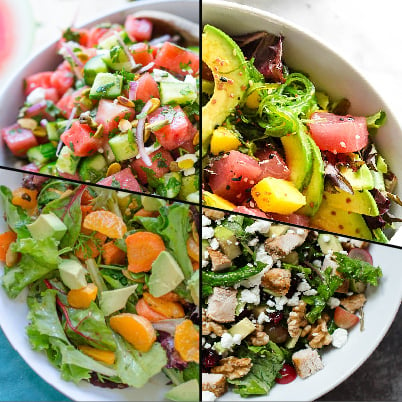Most commonly referred to as Magic Shell, this sweet, crunchy, chocolate-y goodness that you once enjoyed as a child is much worse for you than you probably realized (which is why your mom only allowed it on special occasions).
In a nutshell, these dessert toppings are superhigh in saturated fat. And while current research shows a little saturated fat isn't all that bad for you, the two-teaspoon serving recommendation for most hardenable dessert toppings is over the top, with 7 grams of saturated fat (37 percent of your daily recommended intake). To put that number in perspective, an 85 percent lean, 3-ounce ground beef patty has only 5 grams of saturated fat, which is 25 percent of your daily recommended intake. "While saturated fats aren't quite the evil dietary villain they were just a few years ago, it's always a good idea to replace them with healthier, mono- or poly-unsaturated fats, when possible," says Dr. Adams. "Too much saturated fat has been linked to increased levels of LDL (bad) cholesterol."
Instead, Dr. Adams recommends opting for fresh fruit instead. "It is much lower in calories -- half a cup is around 60 versus the two tablespoons of dessert topping at a whopping 210," he says. "Even making your own topping with a little bit of melted peanut butter and a touch of honey is a great choice -- and the peanut butter gives you a good dose of healthier fat!"
Image via Foodrepublic.com
In a nutshell, these dessert toppings are superhigh in saturated fat. And while current research shows a little saturated fat isn't all that bad for you, the two-teaspoon serving recommendation for most hardenable dessert toppings is over the top, with 7 grams of saturated fat (37 percent of your daily recommended intake). To put that number in perspective, an 85 percent lean, 3-ounce ground beef patty has only 5 grams of saturated fat, which is 25 percent of your daily recommended intake. "While saturated fats aren't quite the evil dietary villain they were just a few years ago, it's always a good idea to replace them with healthier, mono- or poly-unsaturated fats, when possible," says Dr. Adams. "Too much saturated fat has been linked to increased levels of LDL (bad) cholesterol."
Instead, Dr. Adams recommends opting for fresh fruit instead. "It is much lower in calories -- half a cup is around 60 versus the two tablespoons of dessert topping at a whopping 210," he says. "Even making your own topping with a little bit of melted peanut butter and a touch of honey is a great choice -- and the peanut butter gives you a good dose of healthier fat!"
Image via Foodrepublic.com
In case you don't know the technical difference between margarine and butter, here's your two-second lesson: Butter is made from milk or cream, while margarine is non-dairy and often made from plant-based fats. It's often preferred over real butter because it's lower in saturated fats and it spreads more easily, but Rebekah Blakely, R.D., dietitian for The Vitamin Shoppe, explains that there's more to margarine than meets the eye. "Margarine is essentially a lab-created food, with around 10-12 ingredients versus butter's three," she says. "Additionally, margarine has traditionally been made with trans fats (ingredient: partially hydrogenated oils) which are detrimental for heart health and worse than the saturated fats they replaced."
The good news is that the FDA has ordered all trans fats be removed from our food supply by 2018, so manufacturers are already beginning to replace it with other alternatives, like palm oil. However, most margarines are also made of vegetable oils high in omega-6, which, Blakely notes, the typical American already gets way too much of in their diet. "When we don't balance out our omega-6 intake with omega-3s (like salmon, sardines, chia, flax), we can have increased inflammation in our body," she says.
Instead of margarine, she recommends using small amounts of real, grass-fed butter instead of margarine and planning for the majority of your fat intake to come from healthy plant sources like olive oil, avocados, nuts, and seeds.
Image via Getty
The good news is that the FDA has ordered all trans fats be removed from our food supply by 2018, so manufacturers are already beginning to replace it with other alternatives, like palm oil. However, most margarines are also made of vegetable oils high in omega-6, which, Blakely notes, the typical American already gets way too much of in their diet. "When we don't balance out our omega-6 intake with omega-3s (like salmon, sardines, chia, flax), we can have increased inflammation in our body," she says.
Instead of margarine, she recommends using small amounts of real, grass-fed butter instead of margarine and planning for the majority of your fat intake to come from healthy plant sources like olive oil, avocados, nuts, and seeds.
Image via Getty
We're looking at you, caramels. Not only is the sugar content in these badboys typically through the roof (one piece contains almost 7 grams!), but chewing on them often quickly leads to tooth decay. "The adherence in caramel candies sticks to your teeth along with the bad bacteria trapped underneath it," says Victoria Veytsman, New York City dentist and RealSelf contributor. "It is difficult to brush off and gets stuck in the micro nooks and crannies of teeth."
In fact, even after rinsing with water or mouthwash doesn't do a good job of removing it, and your saliva has a tough time washing it away as the time goes on." I've also seen many fillings and teeth chip or fracture because of the stickiness of the caramels," adds Dr. Veytsman.
While most candy is crawling with sugar, the best way to curb your sweet tooth cravings is with dark chocolate. In fact, studies have found that a compound in chocolate may be even better for your teeth than fluoride, as it helps harden tooth enamel.
Image via Getty
In fact, even after rinsing with water or mouthwash doesn't do a good job of removing it, and your saliva has a tough time washing it away as the time goes on." I've also seen many fillings and teeth chip or fracture because of the stickiness of the caramels," adds Dr. Veytsman.
While most candy is crawling with sugar, the best way to curb your sweet tooth cravings is with dark chocolate. In fact, studies have found that a compound in chocolate may be even better for your teeth than fluoride, as it helps harden tooth enamel.
Image via Getty
We've heard these buzzy beverages are bad for us, but can't help but give in when an afternoon crash hits hard. The truth is, energy drinks are far more dangerous than your average cup (or three) of joe. In fact, the Drug Abuse Warning Network reports a sharp increase in the number of emergency visits as a result of consuming energy drinks, from 1,128 visits in 2005 to 13,114 visits in 2009.
"There is so much caffeine in these drinks that they can cause an arrhythmia, or abnormal heart rhythm," says Nicole Weinberg, M.D., cardiologist at Providence Saint John's Health Center in Santa Monica, California. "In rare and extreme cases, sudden death has been linked with excessive caffeine from these energy drinks."
From a medical standpoint, these energy-boosting beverages have little-to-no nutritional value -- they're loaded with as much as five times the amount of caffeine in one regular cup of coffee, a caffeine-containing plant called guarana, as much as 35 grams of sugar, as well as taurine, ginseng and some B vitamins which are thrown in for kicks. It's also worth noting that energy drinks are not regulated by the Food and Drug Administration (FDA), so there's more of a risk for negative side effects than almost anything else on the market, Dr. Weinberg notes.
Image via Getty
"There is so much caffeine in these drinks that they can cause an arrhythmia, or abnormal heart rhythm," says Nicole Weinberg, M.D., cardiologist at Providence Saint John's Health Center in Santa Monica, California. "In rare and extreme cases, sudden death has been linked with excessive caffeine from these energy drinks."
From a medical standpoint, these energy-boosting beverages have little-to-no nutritional value -- they're loaded with as much as five times the amount of caffeine in one regular cup of coffee, a caffeine-containing plant called guarana, as much as 35 grams of sugar, as well as taurine, ginseng and some B vitamins which are thrown in for kicks. It's also worth noting that energy drinks are not regulated by the Food and Drug Administration (FDA), so there's more of a risk for negative side effects than almost anything else on the market, Dr. Weinberg notes.
Image via Getty





